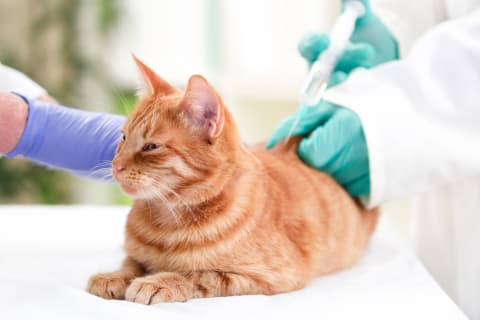What is Rabies?
The viral disease rabies is usually found in wild animals — most often in skunks, foxes, bats and raccoons. That said, the disease can infect any mammal if they are exposed. This is why it is critical to protect our pets with regular rabies vaccines.
Both indoor and outdoor cats can become infected with rabies. In this post, we'll tell you what you need to know about the rabies vaccine and why it's one of the most important cat vaccinations. We'll also provide a pet vaccinations schedule, list side effects, share tips for prevention and more.
How is rabies transmitted?
Since rabies is transmitted through saliva from an infected animal, the most common way pets become infected is by sustaining bites from infected wildlife. While there have been cases of non-bite exposures where open wounds, scratches or abrasions are contaminated with infected saliva, these cases are rare.
How is rabies diagnosed and treated?
It's not possible to diagnose rabies in a live animal, as the disease can only be diagnosed by direct examination of the brain. If a veterinarian suspects an animal has rabies, or if an animal exhibiting symptoms or rabies suddenly dies, the vet may recommend submitting a brain sample for testing.
There is no treatment for a cat with a rabies infection. Since rabies is zoonotic, it can be transmitted from an animal to humans and there is potential risk to people.
If there is a high probability of exposure in an unvaccinated, exposed cat the safest policy is to euthanize the animal (many states require it for unvaccinated animals exposed to potentially rabid animals). Alternatively, it may be strictly quarantined for many months to prevent risk of escape or injury to people.
By law, veterinarians are required to notify the animal disease regulatory authorities.
If a cat that's been exposed has been vaccinated previously, a booster vaccination is required, followed by at least 30 days of quarantine and careful observation.
Should my cat be vaccinated?
Yes. It's important for cats to receive the rabies vaccine as it's required by law in most states. Vaccination against the disease is important to the safety of both people and cats.
Does my indoor cat need the rabies vaccine?
It is very important that all cats are vaccinated against rabies, including cats that are never outside.
While your cat may be kept indoors, this doesn't mean they won't ever escape or that wildlife will not find its way into your home.
Bats often find themselves inside homes after coming down chimneys or making their way into attics. Cats also instinctively hunt bats. Furry felines are more likely to chase and try to play with or catch a bat. Raccoons also sometimes make their way into attics.
To eliminate the risk for rabies, having your cat vaccinated is the best choice.
What is the rabies vaccine? Why is it important?
Rabies is a very serious disease and is predominantly fatal for pets that are unvaccinated. Since it's impossible to diagnose rabies in living animals, euthanasia is required.
Once rabies symptoms take hold, the disease is nearly always fatal in animals and treatment options are usually supportive. This is why proactive prevention with the rabies vaccine is essential.
The vaccine is very effective and is typically provided to kittens at three or four months of age. Depending on your state laws and your vet's advice, revaccination may be recommended at specific times.
How often should cats get a rabies vaccine?
There are many different brands of rabies vaccines for cats available, and each comes with guidelines from the manufacturer that must be followed by the administering veterinarian.
Depending on the type of vaccine your cat receives, they may need to see us annually or once every three years. Our vets provide pet vaccinations for animals near Flat Rock and surrounding areas.
Are there side effects to the rabies vaccine?
Reactions to vaccines are very rare in cats. When they do occur, they may include slight fever, decreased appetite, localized swelling at the vaccine site and lethargy. These side effects usually disappear within a few days.
In extremely rare cases, a cat may develop an allergic reaction to the vaccine that includes itchiness, facial swelling and hives. Severe reactions may include weakness and collapse. These are also extremely rare.
Note: The advice provided in this post is intended for informational purposes and does not constitute medical advice regarding pets. For an accurate diagnosis of your pet's condition, please make an appointment with your vet.
Do you have questions about the rabies vaccine for your cat? Contact our Flat Rock vets at Western Carolina Regional Animal Hospital & Veterinary Emergency Hospital today to book an appointment for your dog.
Looking for a vet in Flat Rock?
We're always accepting new patients, so contact our veterinary hospital today to book your pet's first appointment.Related Articles View All
Make Vet Visits Less Stressful for Your Pet
Do trips to the vet leave you and your dog or cat frazzled and traumatized? Taking an anxious pet to their wellness exam can certainly be stressful. Here, we share tips to help reduce your pet's anxiety around vet visits.
Microchips for Cats
There are a few benefits to microchipping a cat, including increasing the likelihood of finding them if they become lost. Learn more about this technology from our Flat Rock veterinarians.
I Think My Dog Has Hookworm - What Should I Do?
Have you spotted hookworms in your dog's poop? Here, you will find information on how hookworms can be treated, and ways to prevent your dog from contracting this parasite in the future.
What causes ear mites in cats? How are they treated?
Ear mites are highly contagious parasites that cause intense itching and scratching in cats, often leading to infections and health problems. Today's post explains the symptoms, causes, and treatment for this problematic parasite.

